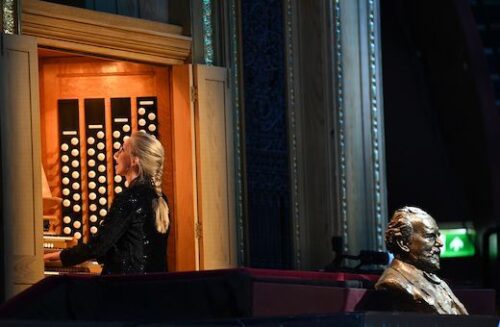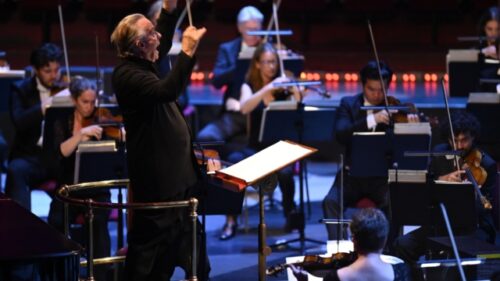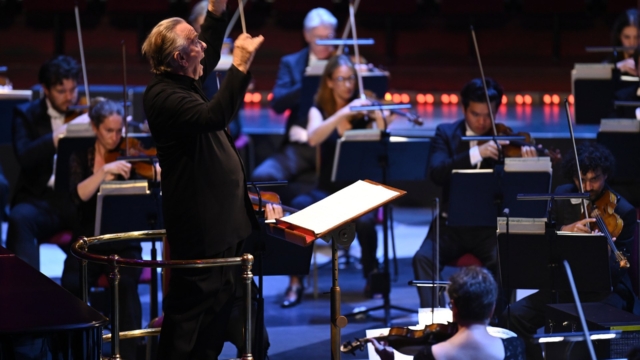 United Kingdom BBC Proms 2021 [25] – Chin, Beethoven, Saint-Saëns: Benjamin Grosvenor (piano), Anna Lapwood (organ), Hallé / Sir Mark Elder (conductor). Royal Albert Hall, London, 7.9.2021. (CC)
United Kingdom BBC Proms 2021 [25] – Chin, Beethoven, Saint-Saëns: Benjamin Grosvenor (piano), Anna Lapwood (organ), Hallé / Sir Mark Elder (conductor). Royal Albert Hall, London, 7.9.2021. (CC)

Unsuk Chin – subito con forza (2020, UK premiere)
Beethoven – Piano Concerto No.4 in G, Op.88 (with cadenzas by Saint-Saëns)
Saint-Saëns – Symphony No.3 in C minor, ‘Organ’
Another nicely full BBC Prom at the Royal Albert Hall; great to see things getting back to something approaching normality. And so good also to see a BBC co-commission (with the Cologne Philharmonie and the Royal Concertgebouw Orchestra, Amsterdam) and, getting its UK premiere, subito con forza by Unsuk Chin.
This was the first in a chain of associations that ran through the contact. Chin uses a tapestry of Beethoven’s music (most obviously in the Coriolan reference of the opening) to celebrate Beethoven 250 (she wrote the piece in 2020). But that Coriolan opening explodes like a supernova into a completely contemporary space where Beethovenian groupings and gestures slither and slide in a liminal space as if seeking to (re-)establish their identity – or perhaps to blossom forth into a new one. Another aspect of Chin’s inspiration was Beethoven’s Conversation Books, and the frustrations that are expressed there.
Chin’s triumph is to successfully move between tonal references, Beethovenian bare octaves, references to pieces (Leonore 3 and its world seem only a heartbeat away, and of course the Fifth Symphony is there). But the fascination lies in Chin’s collage. The piece is brief (only around five minutes) but highly effective as a concert opener – particularly prior to some Beethoven ….
Talking of which, Benjamin Grosvenor’s performance of Beethoven’s Fourth Concerto was a revelation, a performance of maturity beyond his years. The idea of linking it to the second half symphony by utilising Saint-Saëns’s cadenzas was inspired. The first movement one certainly contains moments that could only be by Saint-Saëns – a flavour of another time when HIP was hardly the consideration it is today: music was fresh and developing, not yet ready to be reconstructed. Effectively, Saint-Saëns via Grosvenor’s superbly articulated playing took us to another world: how skilfully and cleverly Saint-Saëns led us back to the Beethoven original and the conclusion of the first movement.

The performance was effectively a rethinking of the score with illumination at almost every turn. And who better to partner with than Sir Mark Elder, whose legion experience in the opera pit makes him the concerto partner par excellence. And indeed it proved so, piano and orchestra negotiating the many tricky corners in this concerto with seeming ease. So, when Grosvenor gave Beethoven’s beautiful treble melodies space to breathe, the orchestra was a cushion of sound supporting that. Grosvenor’s calming responses to the orchestra in the slow movement were simply beautiful, the tone warm, each chord individually, perfectly balanced. This was pianistic control of the very first order, equally as impressive as the prestidigitations of the outer movements. The finale brought with it another ‘guest’ cadenza from Saint-Saëns, sparkly as one might imagine, but also tending towards the pleasingly manic.
What with Grosvenor breathing fresh magic into his every gesture and line, plus the novelty of those cadenzas, this was like hearing the music anew. How often can one say that of such a core repertoire piece? The encore was Liszt, but in a light, mischievous almost Saint-Saëns mode: the Concert Etude ‘Gnomenreigen’ (obviously a favourite with Grosvenor as it is not the first time I have heard it from him after a concerto performance).
Wonderful to have Anna Lapwood, making her Proms debut, as the organist in Saint-Saëns’s Organ Symphony (coinciding nicely with the release of her latest album, Images on Signum, which includes arrangements of movements from Ravel’s Le Tombeau de Couperin and Britten’s Peter Grimes for organ). She was, of course, at the helm of one of the great organs – the Royal Albert Hall Grand Organ recitals in previous years have been real highlights. Hearing the organ in tandem with the Hallé was a sonically glorious experience, beyond doubt.
All of which would mean nothing if it were not for the structural grasp and sense of line of Elder’s reading. This was a performance to remind us of Saint-Saëns’s stature as a composer, each movement perfectly crafted. Strength, grace and dynamism were all part of the first movement (and even the occasional violin portamento for good measure). The truly impressive aspect of this performance from an orchestral perspective was the unanimity of the strings, both the larger group and the way that the first violins were totally in accord in Saint-Saëns’s glorious melodies.
The most marvellous thing about the hall’s organ is that sometimes you feel it rather than hear it – those subterranean pedal notes seem to go straight through to the listener’s core. Certainly, that was the case in the second movement (Poco adagio), while at the end the organ just glowed, fully the equal of the Hallé’s full might. Woodwind on the top of their game proffered delight after delight; the only minor issue came from the brass, where in the hall the trumpets seemed a touch muted (not in the literal sense, but less bright) when heard in conjunction with brass colleagues in the orchestra, particularly the trombones. A minor quibble, though: Elder sought to show us that Saint-Saëns’s Third Symphony contains a massive spectrum of emotion, from the tenderest flute melody (Amy Yule) and the most interior, almost proto-Mahlerian, slow string melody to the grandeur of the final peroration.
It was nice to be in the safe hands of Lapwood on the organ, with Elder and his band providing a sound to die for. I wonder what is happening up North these days? Both the Hallé and the Royal Liverpool Philharmonic Orchestra are playing on top form, with the RLPO entering a potential golden period with Domingo Hindoyan, and the Hallé already in the midst of one.
Colin Clarke

After missing out on the Proms for two years we chose the Halle under Sir Mark Elder, with soloists Benjamin Grosvenor and Anna Lapwood, for our return visit. What an evening of pure musical delight. The playing of the musicians in the orchestra, with superb soloists on the piano and organ, was profoundly moving. The sound created by the strings sent shivers up the spine and moved the soul at the same time. Listening to a Symphony Orchestra live, is surely one of the glorious and uplifting experiences of life. We travelled from Somerset for this concert. What a night out as my wife and I heralded the new world after lock down! Long live the Proms and live music.